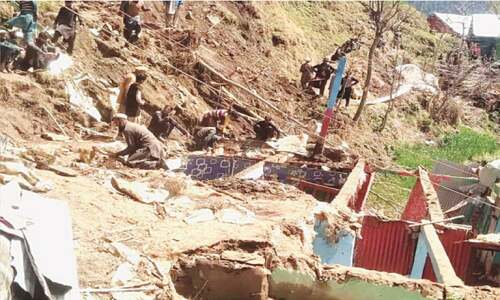PESHAWAR: The Peshawar High Court has ruled that the district development advisory committee set up in every district is only an advice-giving body and therefore, the execution of the development schemes recommended by it is not binding on the government.
A bench consisting of Chief Justice Yahya Afridi and Justice Syed Afsar Shah gave the ruling while dismissing a petition of Pakistan Muslim League-Nawaz MPA from Battagram district, Wali Mohammad Khan, against the provincial government’s decision to launch development schemes in the Annual Development Programme on the recommendations of the Battagram district nazim instead of that of the relevant MPA or DDAC.
The bench, which had pronounced its order on May 17, wrote in its 32-page detailed judgment that the DDAC had no legal authority to interfere in the developmental schemes proposed and sanctioned by the local governments under the Local Government Act, 2013.
The court also declared that the development projects included in the ADP and approved by the provincial Assembly couldn’t be ‘agitated in a court of law being ‘non-justiciable.’
Declares district development advisory committee a consultative body
It however ruled that those umbrella projects placed as block allocations without any specification of site and location were exception.
“Such allocation may lead to discretionary allocations at a subsequent stage, hence, could be legally agitated on the touchstone impropriety, bias and discrimination.”
The bench observed that the objected schemes and the schemes of the petitioner didn’t fall within the 30 percent developmental budget allocated to the local government and therefore, legally the DDAC was competent to recommend the site and allocation of the said projects.
“Act of 1989 (DDAC Act 1989) does not provide any penalty or a consequence in failure to recommend the site or allocation of the project to be carried out in the district. Thus, the provision of recommending the site and allocation by DDAC is directory and not mandatory,” the bench ruled.
It further provided that all the developmental projects prepared by the Planning and Development (P&D) Department and placed for approval of the Provincial Assembly have to be voted upon and passed by a simple majority of the members of the Provincial Assembly. “The objected scheme and the petitioner’s schemes were duly included in the ADP by the P&D Department and placed before the Provincial Assembly for its approval, which was duly accorded.”
The court pronounced that the objected scheme having been approved by the Provincial Assembly without any objection by the petitioner during budget would legally bar him to oppose the same before this Court on the principle of estoppel by conduct.
In the instant petition the bench had heard detailed arguments of different parties.
Lawyers Shumail Ahmad Butt and Hazrat Bilal had represented the Battagram district nazim, Additional advocate general Waqar Ahmad Khan appeared for the provincial government, additional secretary Tanzeela Sabahat represented planning and development department, whereas Barrister Babar Imran appeared for the petitioner.
The petitioner had contended he was being discriminated against by the provincial government for his party affiliation in illegally approving developmental projects in his constituency and in violation of law particularly the KP Establishment of District Development Advisory Committee Act, 1989, the district nazim, affiliated with ruling Pakistan Tehreek-e-Insaf, had been exercising unlawful influence in carrying out developmental schemes. He contended that the selection of site and allocation of projects within a district would fall within the domain of DDAC and the Objected Schemes introduced by the district nazim was a clear violation of the law.
The bench in its judgment has also highlighted the evolution taking place in the country after its creation regarding approval and carrying out of developmental schemes.
After explain the role of the P&D Department, the DDAC and local government regarding developmental projects, the bench observed that the three bodies have to proceed and function in accordance with the laws, which regulates each; the P&D Department according to the Rules of Business, the Local Governments under the LGA, 2013, and DDAC under the DDAC Act of 1989.
“A recommendation of DDAC regarding site and location of developmental project is not final, and has to be assessed, analyzed and if found appropriate, be approved by the competent authority; the P&D Department,” the court ruled adding that there was no legal bar restraining the provincial government to select the location of a developmental project in District Battagram.
“The authority vested in the P&D Department, as provided in the Rules of Business has a constitutional backing thereto seeking recommendation from DDAC is one thing but urging the entire Provincial Executive Authority to be subservient to the recommendation of the DDAC is not what was intended by the legislature in enacting the Act of 1989.”
The bench pronounced that the role of DDAC in its recommendation of the site and location of developmental projects cannot be imposed upon the local governments functioning under the LGA, 2013. It was added that the 30% budgetary allocation to the Local Governments is to be dealt with by the respective local governments in accordance with the provisions provided in LGA, 2013.
Published in Dawn, May 20th, 2017















































